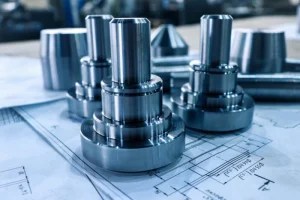Precision engineering details can revolutionize education by reshaping how students learn. The fusion of precision engineering principles with educational practices opens new horizons for immersive learning. This shift transcends traditional methods, offering a transformative educational journey.
Key Takeaways
- Precision engineering enhances student learning by fostering a deeper understanding of complex concepts and practical applications.
- Integration of precision engineering in curriculum design elevates the educational experience by promoting a meticulous approach to learning.
- Hands-on applications of precision engineering engage students, develop critical thinking skills, and promote collaboration essential for success in the engineering industry.
- Assessment of precision engineering in education measures students’ proficiency in applying theoretical knowledge and problem-solving skills, preparing them for precision-based careers.
Importance of Precision Engineering Details
Exploring the significance of precision engineering details unveils the key foundation that underpins advancements in various fields, revolutionizing processes and outcomes. Precision engineering play a crucial role in ensuring the accuracy, reliability, and quality of products and services across industries. From aerospace to biomedical engineering, the meticulous attention to detail in design, manufacturing, and testing stages can make a significant difference in the final product’s performance and longevity.
In manufacturing, precision engineering overview dictate the tolerances, material selections, and assembly processes that ultimately determine a product’s success in the market. For example, in the automotive industry, precision engineering ensures that components fit seamlessly, reducing friction and enhancing overall efficiency. This level of detail is also vital in medical devices, where even the smallest deviation can impact patient safety and treatment outcomes.
Moreover, precision engineering overview are essential in research and development, where innovations rely on accurate measurements and precise calibration. By focusing on the importance of precision engineering details, professionals can elevate standards, drive progress, and inspire a new generation of meticulous engineers dedicated to excellence.
Enhancing Student Understanding Through Precision Engineering
Enhancing student comprehension through the integration of precision engineering principles fosters a deeper grasp of complex concepts and practical applications in various academic disciplines. By incorporating precision engineering details into the learning process, students are exposed to a more structured and systematic approach to problem-solving. This method not only enhances their critical thinking skills but also provides a foundation for a more profound understanding of the subject matter.
Precision engineering offers a unique perspective that encourages students to pay attention to the smallest details, fostering a mindset that values accuracy and meticulousness. This attention to detail is crucial in fields such as mathematics, physics, and engineering, where precision is paramount. Through hands-on experience with precision tools and technologies, students can bridge the gap between theoretical knowledge and real-world applications, preparing them for future challenges in their academic and professional pursuits.
Integrating Precision Engineering in Curriculum Design
Incorporating precision engineering principles into curriculum design elevates the educational experience by infusing a meticulous and structured approach to learning. By integrating precision engineering in curriculum design, educators can revolutionize the way students engage with complex subjects.
Here are five ways this integration can transform the learning experience:
- Enhanced Problem-Solving Skills: Precision engineering challenges students to think critically and analytically, honing their problem-solving abilities.
- Real-World Application: Integrating precision engineering concepts allows students to see the practical applications of their learning in various industries.
- Attention to Detail: Students learn to pay close attention to details, fostering a sense of thoroughness and accuracy in their work.
- Interdisciplinary Learning: Precision engineering cuts across various disciplines, encouraging interdisciplinary connections and a holistic understanding of subjects.
- Career Readiness: By incorporating precision engineering in curriculum design, students are better prepared for careers that require precision, accuracy, and innovation.
This approach not only enriches the educational journey but also equips students with valuable skills for their future endeavors.
Hands-On Applications for Student Engagement
Building on the foundation of integrating precision engineering principles into curriculum design, the practical implementation of hands-on applications further enhances student engagement and comprehension. By incorporating hands-on activities, students can apply theoretical knowledge to real-world scenarios, fostering a deeper understanding of complex engineering concepts. These hands-on experiences provide students with a tangible connection to the subject matter, making learning more interactive and memorable.
Engaging in practical tasks such as assembling precision components, conducting experiments, or designing prototypes allows students to develop critical thinking skills and problem-solving abilities. Through hands-on applications, students can experience the challenges and rewards of working with precision engineering details firsthand, preparing them for future careers in the field.
Moreover, hands-on activities promote collaboration and teamwork among students, encouraging peer-to-peer learning and the exchange of ideas. This interactive environment not only enhances the learning experience but also cultivates essential skills such as communication and cooperation, which are vital for success in the engineering industry. By incorporating hands-on applications into the curriculum, educators can create a dynamic and stimulating learning environment that empowers students to become proficient in precision engineering.
Leveraging Precision Engineering for Real-World Projects
Leveraging the intricate principles of precision engineering opens doors to innovative solutions in real-world projects, pushing boundaries and setting new standards in the field. When applied to real-world projects, precision engineering can revolutionize outcomes by:
- Enhancing Efficiency: Precision engineering techniques streamline processes, reducing time and resources required for project completion.
- Improving Accuracy: By incorporating precise measurements and calculations, projects achieve a higher level of accuracy and reliability.
- Fostering Innovation: Precision engineering encourages out-of-the-box thinking, leading to novel solutions and approaches in project development.
- Ensuring Quality: The meticulous nature of precision engineering guarantees that projects meet high-quality standards, enhancing overall outcomes.
- Boosting Sustainability: Through optimizing resource utilization and minimizing waste, precision engineering contributes to sustainable project practices, aligning with eco-conscious initiatives.
Incorporating precision engineering into real-world projects not only elevates the final results but also cultivates a culture of excellence and continuous improvement within the industry.
Measuring Impact: Student Performance and Precision Engineering
Measuring the impact of precision engineering on student performance unveils a realm where academic achievement intersects with practical application, shaping a holistic learning experience. By incorporating precision engineering details into the academic curriculum, students are not only equipped with theoretical knowledge but also the ability to apply it in real-world scenarios. This fusion allows for a deeper understanding of concepts and fosters critical thinking and problem-solving skills among students.
Assessing student performance in precision engineering involves evaluating not only traditional metrics like grades but also practical skills such as precision in measurements, attention to detail, and innovative problem-solving. Through project-based assessments and hands-on activities, educators can gauge students’ mastery of precision engineering concepts and their ability to translate theoretical knowledge into practical solutions.
Furthermore, tracking the impact of precision engineering on student performance can reveal trends in academic improvement, student engagement, and overall learning outcomes. This data-driven approach enables educators to tailor their teaching methods to enhance student learning experiences and better prepare them for future challenges in the field of precision engineering.
Frequently Asked Questions
How Do Precision Engineering Details Contribute to the Overall Learning Experience for Students?
Precision engineering details enhance student learning by fostering critical thinking, problem-solving, and attention to detail. These intricacies provide real-world applications, improving comprehension and skill development. By incorporating precision engineering overview, students engage in hands-on learning experiences that cultivate expertise and innovation.
Are There Any Specific Tools or Technologies Used to Enhance Precision Engineering in Education?
Innovative tools and technologies like CAD software, CNC machines, and 3D printers are integral to enhancing precision engineering in education. These resources offer hands-on experiences, foster creativity, and provide practical skills that prepare students for real-world applications.
What Are Some Challenges Associated With Integrating Precision Engineering Into Curriculum Design?
Integrating precision engineering into curriculum design can pose challenges such as aligning complex concepts with student comprehension levels, ensuring availability of necessary resources for practical application, and training educators adequately to deliver these advanced topics effectively.
Can You Provide Examples of Hands-On Applications That Incorporate Precision Engineering for Student Engagement?
Examples of hands-on applications incorporating precision engineering for student engagement include creating miniaturized robots, designing intricate 3D-printed structures, and assembling intricate mechanical systems. These activities foster critical thinking, problem-solving skills, and practical knowledge application.
How Do Educators Assess the Impact of Precision Engineering on Student Performance and Learning Outcomes?
Educators assess the impact of precision engineering on student performance and learning outcomes through data analysis, feedback mechanisms, and evaluation tools. Utilizing quantitative and qualitative measures, educators can gauge the effectiveness of precision engineering in enhancing student learning experiences.
Conclusion
In conclusion, the integration of precision engineering details in education presents a transformative opportunity to enhance student learning experiences. By focusing on meticulous components and principles, educators can revolutionize traditional teaching methods and cultivate a more immersive and effective learning environment.
The potential benefits and challenges associated with this innovative approach highlight the importance of incorporating precision engineering in curriculum design and hands-on applications to measure its impact on student performance.
You May Also Like:


